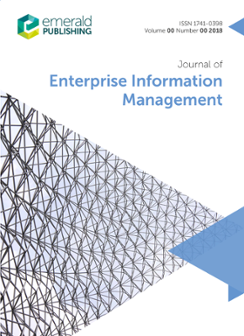Table of contents
Assessing the feasibility of blockchain technology in industries: evidence from Turkey
Ismail Erol, Ilker Murat Ar, Ali Ihsan Ozdemir, Iskender Peker, Ali Asgary, Ihsan Tolga Medeni, Tunc MedeniThe objective of this study is to assess quantitatively how feasible blockchain is for various industries, such as logistics and supply chain, health, energy, finance, automotive…
Understanding employees' adoption of the Bring-Your-Own-Device (BYOD): the roles of information security-related conflict and fatigue
Hao Chen, Ying Li, Lirong Chen, Jin YinWhile the bring-your-own-device (BYOD) trend provides benefits for employees, it also poses security risks to organizations. This study explores whether and how employees decide…
Why digital goods have not replaced traditional goods: the case of e-books
Jongbum Kim, Jeonghun Seo, Hangjung Zo, Hwansoo LeeElectronic books (e-books) have been in the market for decades but have been unable to replace paper books. Previous studies on e-books have failed to identify significant factors…
Unraveling the impact of cultural distance on IT outsourcing success – insights from three major sourcing reconfigurations
Michael Könning, Susanne Strahringer, Markus WestnerIT outsourcing (ITO) has developed into an established practice for organizations but the interorganizational and oftentimes international collaboration it involves comes at a…
Factors affecting eWOM credibility, information adoption and purchase intention on Generation Y: a case from Thailand
Ahmad Daowd, Ruaa Hasan, Tillal Eldabi, Piyya Muhammad Rafi-ul-Shan, Dongmei Cao, Naphat KasemsarnWith the ever-expanding online shopping, electronic word-of-mouth (eWOM) has become a significant factor affecting the consumer decision-making behaviour. This is specially the…
Social experience vs. social technology in enhancing the intention to use social commerce: a case study of Indonesia
Yonathan Dri HandarkhoThis study proposed a theoretical model to understand user intention to use social commerce (SC) of an emerging market based on social experience and social technology. The SC…
Blockchain for next generation services in banking and finance: cost, benefit, risk and opportunity analysis
Mohamad Osmani, Ramzi El-Haddadeh, Nitham Hindi, Marijn Janssen, Vishanth WeerakkodyThe purpose of this paper is to help in providing a better understanding of the application of blockchain technology in the context of the banking and finance sectors. The aim is…
Beyond profitability: ICT investments and financial institutions performance measures in developing economies
Kamla Ali Al-Busaidi, Saeed Al-MuharramiThe national and global digital transformation makes investments in information and communications technology (ICT) by financial institutions a necessity, not only for gaining a…
How to improve employee satisfaction and efficiency through different enterprise social media use
Ma Liang, Zhang Xin, Ding Xiao Yan, Fei JianxiangWhile prior research provides interesting insights into the effect of social media use in enterprises, there is limited research on how use of different social media platforms…
Effect of information technology-enabled supply chain integration on firm's operational performance
Odkhishig Ganbold, Yoshiki Matsui, Kristian RotaruUsing the assumptions of the resource-based view, relational view and swift, even flow theories and the overarching principles of supply chain management, the study aims to test…

ISSN:
1741-0398Renamed from:
Logistics Information ManagementOnline date, start – end:
2004Copyright Holder:
Emerald Publishing LimitedOpen Access:
hybridEditor:
- Prof Zahir Irani